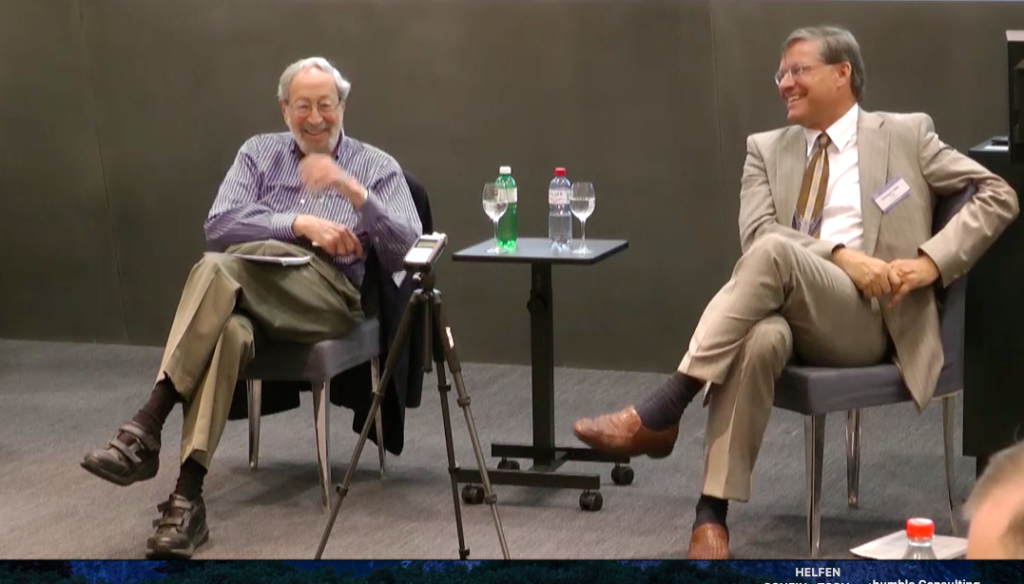
On March 1, I wrote about 30 Eclectic Resources About Edgar H. Schein, Organizational Psychology Pioneer. The highly influential Dr. Schein passed away in January 2023 at the age of 94. One of the resources is a tribute to him from Peter Senge, author of the seminal book The Fifth Discipline. The tribute came via LinkedIn/Gerhard Fatzer, and I later connected with Gerhard for the first time online.
I’m grateful to Gerhard for answering my questions about his organization, the Trias Institute, in Switzerland, as well as his writing and editing, his extensive work with Dr. Schein, and his long, productive career in organization development.
As you will read below, Gerhard has collaborated with many amazing people, including some of the giants of 20th century social psychology, such as Warren Bennis, the dean of leadership studies, and Carl Rogers, one of the founders of humanistic psychology.
The Q&A has been edited for clarity and length.
For the non-specialist reader, how would you characterize your career (including with the Trias Institute), daily work, teaching, and research?
I started as a PH.D in Education at University of Zurich in 1980. With a postdoctoral scholarship, I started out in 1980-82 at UC Santa Barbara and UCLA on schools as learning systems and Organization Development with Fred Massarik, Bob Tannenbaum, Warren Bennis, and Carl Rogers in San Diego.
Then I continued at the MIT Sloan School of Management with Edgar H. Schein, Ed Nevis, Peter Senge, and Otto Scharmer in 1987; and with Chris Argyris, Shoshana Zuboff, and Barbara Kellerman at Harvard.
I returned in 1983 and founded the second Training Program in Switzerland on OD, Coaching and Consulting at University of Applied Science in Zurich. I started my own Trias Institute in 1991 with groups in Switzerland, Germany, and Austria.
I started my OD career with projects all over the world; Africa, Europe, the United States, and later Asia: technical cooperation projects in key industry like Automobile (Ford, Daimler, VW), Airplanes (Airbus, Dornier) IT ( SAP), Consulting (BCG, Berger, ATAG) and universities, as Visiting Professor at Innsbruck University (Austria), University of Kassel (Germany), HSG/University of St. Gallen, ETH (Switzerland), Thapar University in India, The University of Texas at Dallas, and ESSEC Business School in Paris.
There is also a book series EHP Organisation, the journal Profile (2001- 2020), and nine books, including one in English on Ed Schein (2019). Consulting and teaching have included the Trias Masterclass (since 2017), many Trias conferences with Ed Schein and colleagues in Zurich, and research on OD and Change.
Can you describe the nature of your work and friendship with Edgar Schein over the years, and how you first came into contact with him?
As I was working with Warren Bennis at USC and Fred Massarik at UCLA, they pointed out that I should contact Ed Schein, as Warren had been part of the legendary MIT group who worked there with Kurt Lewin. Together with Ed Nevis, Ed invited me as his special guest and visiting Scholar into all his seminars and introduced me also to John Van Maanen, from whom I learnt a lot about Qualitative Research. I could also visit the Sloan Fellows Program.
We started with Ed Schein in 1982 and had a cooperation since then, later including our book series. He was born in Zurich, so he was half-Swiss and half-American. A well-known ritual was that we went to Spruengli, the chocolate place in the heart of Zurich, where we drank the famous hot chocolate, which he always did as a child with his mother. Then he mostly stayed in Hotel Dolder, where his parents used to play tennis in the tennis court. The photographs of these events can be seen in our book Edgar H. Schein: The Spirit of Inquiry {published by Innsbruck University Press in 2019.}
In 2002 we started to invite Ed Schein to our Trias conferences: 2006, 2009, until 2014; with digital cooperation after 2017. Since 2017 we have had our Trias Masterclasses with Ed and Peter Schein on Livestream. In 2021 our book The Art of Change came out, and in 2024 OD as an Art, both from the publishing house Psychosozial in Germany.
What do you see as the current state (both in research and in practice) for the Schein-related topics of psychological safety, organizational culture, and humility; or at least one of these in particular?
Humble Leadership is central to the leadership of the future. It is a core competence of every manager and leader. Ed Schein, together with his son Peter Schein, wrote the three recent books Humble Inquiry , Humble Consulting, and Humble Leadership.
Organizational culture is central to any type of Transformation Process in teams and organizations. Ed Schein’s seminal work will be elaborated even more by his son Peter Schein. Ed Schein invented the organizational culture model in 1985, observing that most OD processes and transformation of the organization was not sustainable, because the basic assumptions were not addressed or made visible.
The new beach models of culture, which they both invented in the last five years are vital and dynamic. We have worked with them already quite successfully.
Psychological Safety was also outlined by Ed Schein as a basic ingredient of any change process. It was later adopted by {Harvard Business School professor} Amy Edmondson, who started with the books Teaming and later The Fearless Organization.
In connection with Ed Schein’s seminal work I would also like to mention the seminal work of Chris Argyris, whom I visited as my second mentor of OD at Harvard. He taught all the central concepts of Action Science, and the elegant concepts of Skilled Incompetence and Defensive Routines.
